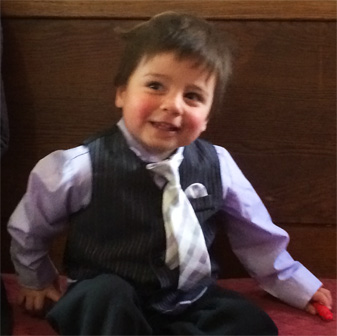Televangelist Victoria Osteen took some flak in the Christian blogosphere last week for a video clip where she says that we should worship God and do good because it makes us happy, and God wants us to be happy. Osteen and her husband Joel are regular targets of critique from other evangelicals who say their message is too upbeat, sin-free, and self-serving. In response, Eric Reitan, a progressive Christian philosopher whose work I admire, wrote this post suggesting that Osteen (in her simplistic way) was putting forth a legitimate Aristotelian theory of true happiness as being in harmony with virtue, as compared to the Kantian view that we’re only virtuous when we act from pure obedience and ignore our own happiness.
I’m Team Aristotle all the way, but that’s another post. What struck me, this time, was that Reitan, Osteen, and probably most of her conservative critics share the common assumption that God does not need anything from humanity. I often hear it said that prayer is for our benefit, not God’s. On this point, evangelicals who emphasize God’s sovereign perfection find common ground with liberal Christians who have trouble believing that prayer could supernaturally alter the course of events. Here’s Reitan’s characteristically clear restatement of this widespread doctrine (boldface emphasis mine):
Here’s what I think Victoria Osteen gets right: When you worship and obey God, you aren’t doing it for God. Doing it for God’s sake makes no sense, because the infinite creator of the universe doesn’t need anything from us in order to be fulfilled. God doesn’t need to be glorified by us, as if God is somehow diminished by failing to be properly fawned over. If there is a need here, it’s our need. We can’t be fully actualized human beings if our priorities are wrong…
…On Christian metaphysics, Victoria Osteen is exactly right when she says we don’t worship and glorify God for God’s sake. We do it for our own. God needs nothing from us, least of all our worship. But if we think God is worthy of worship, then failing to worship God displays a disorder in our value system that will compromise our ability to love others and find joy in life. And if God is the infinite source of value, then connecting with God in worship becomes a way of communing with the good, of letting it enter into us, in a self-actualizing way.
I believe that the boldfaced statements above seriously overstate the case. It’s a leap from “God doesn’t need Hir ego stroked”* to “God doesn’t need anything from us.” This doctrine, which we take for granted as orthodoxy, has hidden negative political and pastoral consequences. Because of what I’ve learned from feminist and disability theology, I am compelled to question the equating of “need” with weakness, imperfection, or immature egotism.
*(I’m trying out the gender-neutral pronouns “zie” and “hir” to refer to God, rather than locutions like “Godself” which I find awkward. Respectful feedback welcomed.)
My analysis is indebted to the philosopher Sara N. Ahmed, who blogs at Feminist Killjoys. Ahmed’s posts often riff on a word that has been negatively applied to a marginalized group, teasing out its complexities with a poetic technique of free association, and turning it on its head to ask whether the shunned trait is properly attributed to the person who “fails” to fit, or the social environment that fails to be welcoming. See, for instance, her thoughts on fragility, imposition, and how a person becomes classified as a stranger.
Though human psychological categories only capture one aspect of the infinite God, we Christians have been invited to relate to God in human terms through the Incarnation. Any concept of a personal God contains value-judgments about the best kind of person to be. These judgments then affect how we treat people who seem different from that ideal. (For instance, the mainstream depiction of God as white and male reinforces some Christians’ sexism and imperialism.) That’s why I think it’s legitimate to ask whether a God without any needs would be a good Person to love, or be loved by.
Where does it come from, this idea of strength as not-needing? What kind of relationship can one have with a Being whose superiority is defined thus?
The need-less God doctrine is partly a product of classical Greek philosophy, in which an entity that is changeless is considered more perfect than one that changes, and an un-caused entity is more perfect than one that is contingent or dependent. However, the Christian’s “personal relationship with God” was not part of this philosophy. These ancient thinkers were looking for a nobler and more mature alternative to the anthropomorphized Greek gods, who were petty, ego-driven, and lustful.
Centuries later, Enlightenment philosophers levelled the same charge against the Old Testament God. To modern people in a pluralistic society, Yahweh’s smiting of Baal-worshippers doesn’t make sense. We are, or should be, burdened by the memory of genocides that claimed Biblical justification. So we read these stories and only see an insecure tyrant. This is the argument that Reitan references when he says God doesn’t need to be fawned over. Reitan wants to salvage the Biblical God by placing Hir above human foibles.
But narcissistic needs are not the only needs. Not-needing, in fact, can be just as egotistical. Imagine God as a parent–something the Bible encourages us to do. “Here, Daddy, I painted you a picture.” “Thanks, but I didn’t need that.” What a cold response to our heartfelt offerings. God is already perfectly fulfilled without any gift from us. Some of you may know what it’s like to have a parent like that. It doesn’t lead to a life of freedom and grace. It breeds perfectionism and self-doubt. Another variation is the caretaker personality who always has to be the giver, not the receiver, because pleasing others is a way to stay in control.
Equality is not necessary for a healthy relationship (e.g. parent-child, God-human), but mutuality is. If our acts of worship are not fulfilling to God as well as to us, the relational aspect fades and the very presence of God becomes needless, a mental placeholder, a merely theoretical component of our religious practices.
As an activist for trauma-informed care in the church environment, I come up against need-shaming all the time. Like any minority group seeking inclusion, our concerns get dismissed as “special needs”. This formulation assumes there is a normal way to navigate the world and I am demanding an exception. In fact, “the world” is just one possible arrangement that works acceptably for the current majority who have a voice in the system. To not have needs, or not be perceived as having needs, or not have to meet your needs in a way that involves other people–is this really a virtue of self-sufficiency or unselfishness, or is it mainly good luck that you have the kind of needs that are met by your environment?
The church will never truly resist domination by the “special needs” paradigm until we stop need-shaming God. We stigmatize each other’s dependence and vulnerability when we recoil in horror at the idea that God could ever experience these states with respect to us.
And yet, the crucified Christ hangs on our wall.
Jesus was needy and vulnerable from his birth as a human baby to his death on a cross. We often talk about this episode in the life of God as though it was temporary, like a journalist slumming among the homeless to show solidarity and gather information. The wounds of the risen Christ tell a different story. What if everything we fear about “neediness” was really an eternal part of God’s essence?
I think mainstream theology is wrong both about what God would need (if Zie needed anything), and what happens when God’s needs aren’t met.
As for the “what”, the prophet Micah said it succinctly: Do justice, love mercy, walk humbly with God. We’re just not used to thinking of these as needs, as well as commands. But a loving God would feel pained, would be diminished, when we don’t act lovingly ourselves. In Matthew 25, Jesus puts himself in the position of the beggar: “Whatever you did for one of the least of these brothers and sisters of mine, you did for me.” He has to spell it out for the disciples because they can’t imagine seeing the Messiah sick or hungry or in prison.
And what actually happens when God’s needs aren’t met? Does Zie have a narcissistic tantrum and kill lots of innocent bystanders? Well, the Book of Judges might give that impression, but there the real problem is the primitive feudal concept of what God needs, as well as the unskillful means. Or does Zie collapse into a big pile of weepy tissues, leaving no one in charge of the universe? (God is a girl, she’s only a girl…)
These are the two hurtful stereotypes that come up when survivors advocate for our own needs. We are made to appear simultaneously tyrannical and weak. In reality, people who face their own pain and take care of it are the most self-sufficient and safe people to have in your community.
Instead of need-shaming, let’s imagine that God feels pain and lack because of human sin, and still carries on with love, strength, equanimity, and nonviolence–just like a trauma survivor who’s doing her healing work.

